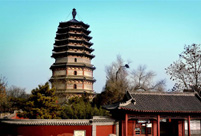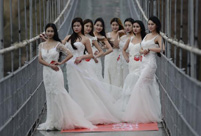


Chinese PresidentXi Jinping(2nd L) is briefed on the development history of the People's Daily in Beijing, capital of China, on Feb. 19, 2016. Xi on Friday visited the People's Daily, Xinhua News Agency and China Central Television, the nation's three leading news providers. (Xinhua/Li Tao)
President pushes for change in publicity strategy
Chinese President Xi Jinping's recent visit to three leading State-owned media outlets signals the beginning of reform to the nation's publicity strategy, the latest among a number of reforms promoted by Xi in the past three years, observers said.
Speaking at a symposium Friday afternoon after touring the People's Daily, the Xinhua News Agency and China Central Television, Xi, also the General Secretary of the Communist Party of China (CPC) Central Committee, said that all news media run by the Party must work to speak for the Party's will and its propositions and protect the Party's authority and unity.
Analysts said that reform measures, rolled out by the CPC over the past three years since the pledge to deepen comprehensive reform in 2013, have strengthened the Party's authority and unity, which can better serve the public.
Xi said Friday that the mission of the Party's media is to provide guidance to the public, serve the country's overall interests, unite the general public, instill confidence and pool our strengths, tell right from wrong and connect China to the world, Xinhua reported.
"Officials should improve their ability to interact with the media and make good use of it to publicize their policies and ideas, understand grass-roots opinions, uncover conflicts and problems, guide public feelings, mobilize the people and push forward work in real life," Xi said.
This is the right time to adjust the Party's publicity efforts, He Hui, head of the Public Relations and Public Opinion Institute of the Communication University of China, told the Global Times on Sunday.
"Rules for our traditional media couldn't deal with the situation of the evolving new media, and the Party needs stronger outlets to promote its policies as comprehensive reforms deepen," said He.
New media significance
On multiple occasions, the president has also shown the importance attached to new media, observers noted.
During Friday's visit to the People's Daily, Xi sent greetings for Monday's Lantern Festival to netizens through the newspaper's social media platforms.
Xi also personally sent a Weibo greeting during a visit to the People's Liberation Army (PLA) Daily in December 2015 to deliver New Year wishes.
The Party has strengthened management of both traditional and new media. It now pays more attention to the media's role in leading public opinion and promoting mainstream social values when new media becomes more influential in people's daily life, He said.
"Party leaders are aware of the different voices on traditional and new media platforms. And the lack of management of new media may undermine the Party's ability to govern," Zhang Zhi'an, dean of the School of Communication and Design at Sun Yat-sen University, told the Global Times.
It is urgent to promote the reform in every aspect while enhancing people's cohesion, as China's reforms, which have caught the world's attention with groundbreaking measures, have entered a crucial stage, Cai Zhiqiang, a Party School of the CPC Central Committee professor, told the Global Times.
Direct leadership
Apart from the sweeping anti-graft campaign that kicked off in 2012, China's military reform also received wide attention as structural reform of the PLA, unveiled in November 2015, shook up the military command system to improve the armed forces' combat capabilities.
Major General Xu Guangyu, a senior consultant of the China Arms Control and Disarmament Association, told the Global Times that the decision to bring the armed forces under the Party's control is based on China's past experiences and "the direct leadership can guarantee unity of the military and prevent separatism or power decentralization from within the armed forces."
Globally, China is eying a more important position to make greater contributions to the international community through Xi's proposals of the "Belt and Road" initiative and a new model of major power relationship, which is all based on win-win diplomatic strategies, said Zhang Weiwei, professor at Shanghai-based Fudan University and director of the Center for China Development Model Research.
Public-centered
The reforms are intended to better serve the country and improve people's livelihood.
Xi stressed at a January meeting of the Chinese People's Political Consultative Conference that the Party should stick to a development path centered on the public. He has also warned that the future and fate of a ruling party is dependent on people's support, according to the Guangming Daily.
Zhang Yiwu, a sociology professor at Peking University, told the Global Times that the social ethos has changed in the past three years since governmental departments and enterprises are now operating in a more regulated way and society as a whole is more orderly.
It is a key symbol that people's livelihood has been highly valued in Chinese political affairs and this is a serious matter of political empowerment and responsibility as the nation works to make the public the real entity that will benefit, the Guangming Daily said.
"More reforms will be promoted in the near future as the Party needs to consolidate its power to lead us to build a strong country," Cai said.
 2016 Miss Chinatown USA pageant held in San Francisco
2016 Miss Chinatown USA pageant held in San Francisco Ancient pagodas across China
Ancient pagodas across China Beijing Film Academy starts 2016 entrance exam
Beijing Film Academy starts 2016 entrance exam Wedding dress show up in the air
Wedding dress show up in the air Have you ever taken these beautiful subways in China?
Have you ever taken these beautiful subways in China? Russian photographer brings fairytales to life
Russian photographer brings fairytales to life Chinese beauties, foreign models meet in Chengdu
Chinese beauties, foreign models meet in Chengdu Awesome! Aerial pictures taken on J-11 fighter
Awesome! Aerial pictures taken on J-11 fighter A foreign girl explains what China should be proud of
A foreign girl explains what China should be proud of Top 20 hottest women in the world in 2014
Top 20 hottest women in the world in 2014 Top 10 hardest languages to learn
Top 10 hardest languages to learn 10 Chinese female stars with most beautiful faces
10 Chinese female stars with most beautiful faces China’s Top 10 Unique Bridges, Highways and Roads
China’s Top 10 Unique Bridges, Highways and Roads Shooting threat mixes online, offline violence
Shooting threat mixes online, offline violence Chinese peacekeepers face violence, food shortages on UN mission
Chinese peacekeepers face violence, food shortages on UN mission Regulations concerning menstrual pain leave a step in the right direction
Regulations concerning menstrual pain leave a step in the right directionDay|Week